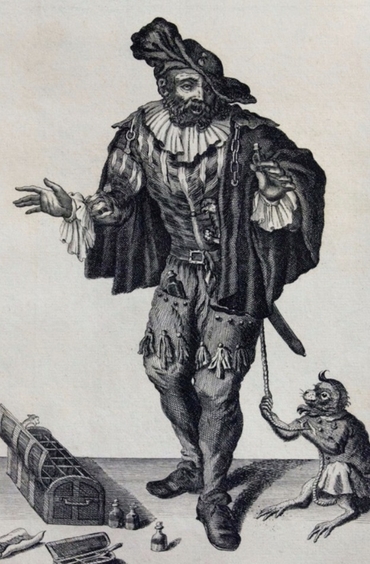Here's Part Five of my serialization of A Journal of the Plague Year, Daniel Defoe's classic portrait of an earlier age of contagion, the Great Plague of London in 1665. In tonight's episode, as governors, premiers, chief ministers and the like are doing or not doing around the world as we speak, the Lord Mayor demonstrates urgency and energy in the executive:
The magistrates began to take the condition of the people into their serious consideration. What they did as to the regulation of the inhabitants and of infected families, I shall speak to by itself; but as to the affair of health, it is proper to mention it here that, having seen the foolish humour of the people in running after quacks and mountebanks, wizards and fortune-tellers, which they did as above, even to madness, the Lord Mayor, a very sober and religious gentleman, appointed physicians and surgeons for relief of the poor—I mean the diseased poor and in particular ordered the College of Physicians to publish directions for cheap remedies for the poor, in all the circumstances of the distemper. This, indeed, was one of the most charitable and judicious things that could be done at that time, for this drove the people from haunting the doors of every disperser of bills, and from taking down blindly and without consideration poison for physic and death instead of life.
The ability to get cheap treatments to the people tests governments to this day - although most contemporary obstacles (regulations, bureaucracy, the unaccountable administrative state) are ones we've thrown in our own path. Still, even swift efficient response runs up against its limits:
I shall not be supposed to lessen the authority or capacity of the physicians when I say that the violence of the distemper, when it came to its extremity, was like the fire the next year. The fire, which consumed what the plague could not touch, defied all the application of remedies; the fire-engines were broken, the buckets thrown away, and the power of man was baffled and brought to an end. So the Plague defied all medicines; the very physicians were seized with it, with their preservatives in their mouths; and men went about prescribing to others and telling them what to do till the tokens were upon them, and they dropped down dead, destroyed by that very enemy they directed others to oppose.
Members of The Mark Steyn Club can hear Part Five of our adventure simply by clicking here and logging-in. Earlier episodes of A Journal of the Plague Year can be found here, and previous Tales for Our Time here.
Nancy Wenlock, a First Day Founding Member from Colorado, writes:
Thank you for this story. Apt, timely and well read of course.
And the music you have picked: perfect. What, pray tell, is it?
It's by John Blow, no relation to Joe Blow. He was organist at Westminster Abbey, choirmaster at St Paul's Cathedral, composer of the Chapel Royal, and sometime teacher of Purcell and Jeremiah Clarke. Before any of that, however, he wrote the soi disant "club anthem" "I Will Always Give Thanks", which is the only piece of music I know of that was actually composed in the plague year of 1665 and which to me sounds just right. I'm glad you agree, Nancy.
If you'd like to join Nancy in The Mark Steyn Club, we'd love to have you: please see here. And, if you've a chum who enjoys classic fiction, we've introduced a special Steyn Gift Membership: you'll find more details here. Oh, and we also do video poetry - and an annual Steyn Club Cruise which shall resume when the coronapocalypse abates somewhat.
Please join me back here tomorrow evening for Part Six of A Journal of the Plague Year.

